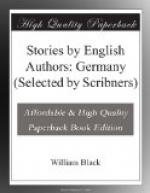“Would you give Patrasche a crust?” he said, timidly. “He is old, and he has had nothing since last forenoon.”
The woman shut the door hastily, murmuring some vague saying about wheat and rye being very dear that season. The boy and the dog went on again wearily; they asked no more.
By slow and painful ways they reached Antwerp as the chimes tolled ten.
“If I had anything about me I could sell to get him bread!” thought Nello; but he had nothing except the wisp of linen and serge that covered him, and his pair of wooden shoes.
Patrasche understood, and nestled his nose into the lad’s hand as though to pray him not to be disquieted for any woe or want of his.
The winner of the drawing prize was to be proclaimed at noon, and to the public building where he had left his treasure Nello made his way. On the steps and in the entrance-hall there was a crowd of youths,—some of his age, some older, all with parents or relatives or friends. His heart was sick with fear as he went among them holding Patrasche close to him. The great bells of the city clashed out the hour of noon with brazen clamour. The doors of the inner hall were opened; the eager, panting throng rushed in. It was known that the selected picture would be raised above the rest upon a wooden dais.
A mist obscured Nello’s sight, his head swam, his limbs almost failed him. When his vision cleared he saw the drawing raised on high; it was not his own! A slow, sonorous voice was proclaiming aloud that victory had been adjudged to Stephen Kiesslinger, born in the burg of Antwerp, son of a wharfinger in that town.
When Nello recovered his consciousness he was lying on the stones without, and Patrasche was trying with every art he knew to call him back to life. In the distance a throng of the youths of Antwerp were shouting around their successful comrade, and escorting him with acclamations to his home upon the quay.
The boy staggered to his feet and drew the dog into his embrace. “It is all over, dear Patrasche,” he murmured—“all over!”
He rallied himself as best he could, for he was weak from fasting, and retraced his steps to the village. Patrasche paced by his side with his head drooping and his old limbs feeble from hunger and sorrow.
The snow was falling fast; a keen hurricane blew from the north; it was bitter as death on the plains. It took them long to traverse the familiar path, and the bells were sounding four of the clock as they approached the hamlet. Suddenly Patrasche paused, arrested by a scent in the snow, scratched, whined, and drew out with his teeth a small case of brown leather. He held it up to Nello in the darkness. Where they were there stood a little Calvary, and a lamp burned dully under the cross; the boy mechanically turned the case to the light; on it was the name of Baas Cogez, and within it were notes for two thousand francs.




